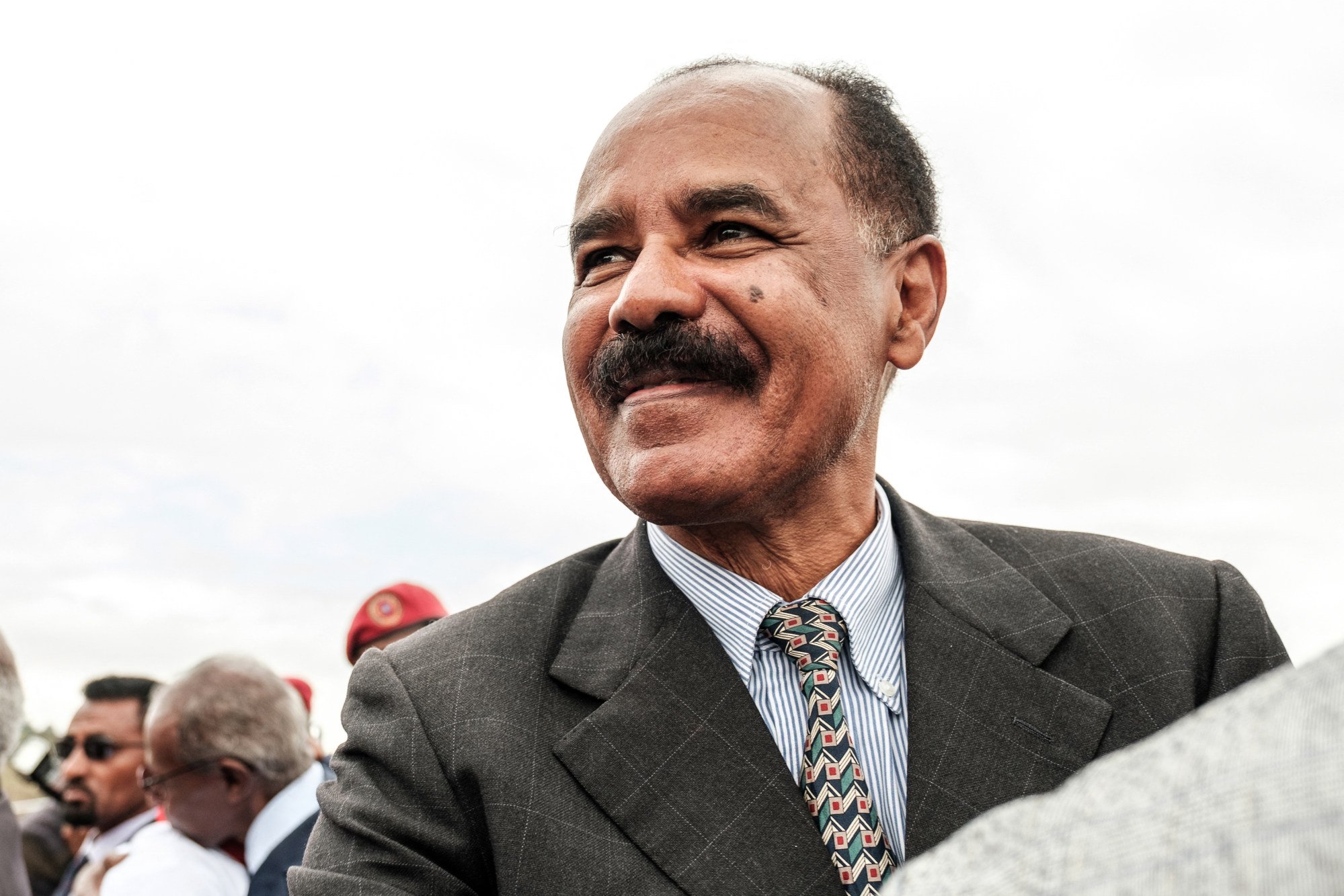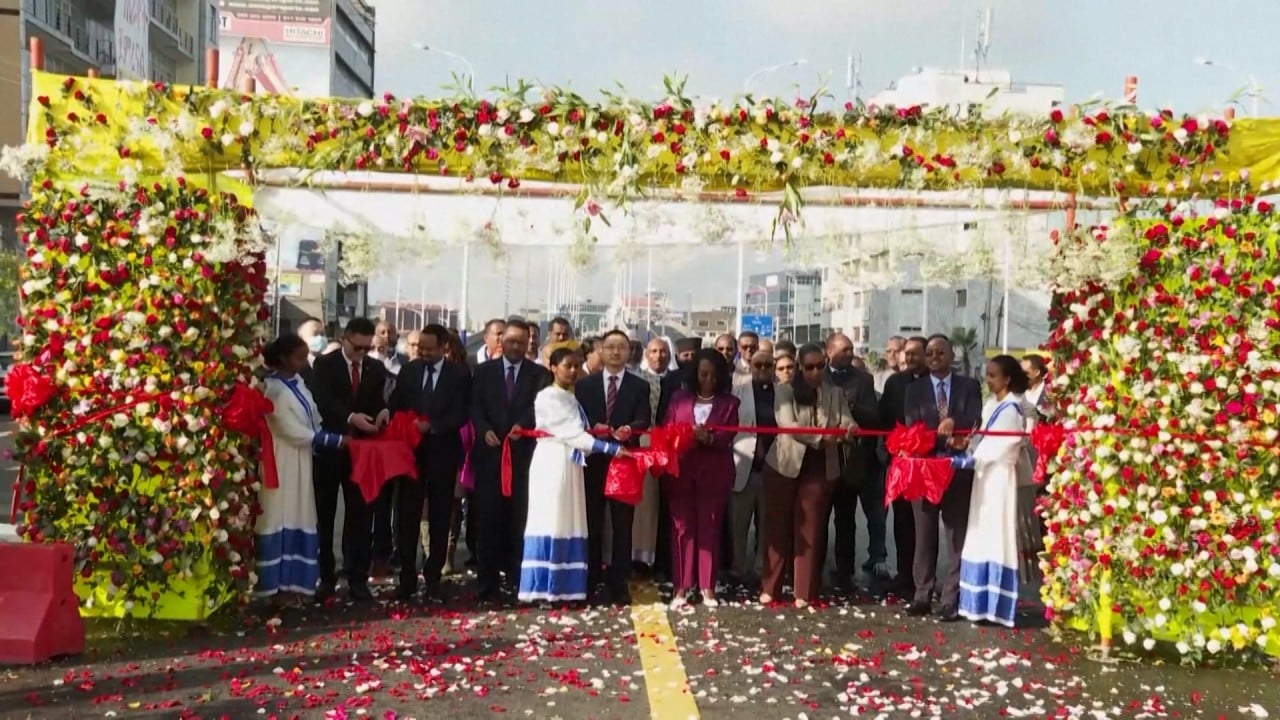
Chinese envoy opposes foreign intervention in Horn of Africa on return to region
- China supports economic integration and the settlement of differences through dialogue
- Expert says Beijing unlikely to be the outside party that will bring disputants to the negotiating table
He has visited Eritrea, Djibouti and Sudan since the middle of this month to promote China’s approach to ending conflicts, which relies on supporting regional development.
In a September 16 meeting with Eritrean President Isaias Afewerki, Xue emphasised China’s readiness to contribute towards regional conflict resolution efforts and the pursuit of sustainable peace and partnerships, Eritrea’s Ministry of Information said. Eritrea and China agreed that development cooperation must be pursued within the framework of regional connections.
Xue also visited Djibouti, home to China’s first overseas military base near the Bab el-Mandeb Strait between the Gulf of Aden and the Red Sea. Beijing has invested heavily in ports and free trade zones in the country.
He then visited Sudan, where China has vast interests in the country’s petroleum industry.
On Wednesday, Xue met General Shams-El-Din Kabashi, a member of Sudan’s Transitional Sovereignty Council.
Xue said the Horn of Africa was important due to its strategic location and that made it subject to foreign interventions.
He emphasised China’s rejection of all forms of foreign intervention in the region and its support for economic integration and the settlement of differences through dialogue.

David Shinn, a China-Africa expert at George Washington University’s Elliott School of International Affairs in Washington and a former US ambassador to Ethiopia, said China had signalled that it had little interest in trying to mediate the complicated conflicts in the Horn of Africa.
Consequently, he said, “China is falling back on its long-standing policy of promoting economic development as a solution to most problems in the region”.
Shinn said China also saw support for development and avoidance of direct involvement in the disputes as less risky and less likely to make enemies for China.
Chinese provinces race along Xi’s ‘green lanes’ to Africa
“Economic development is, of course, a good objective,” he said. “The problem is that economic development alone almost never ends complex and deep-rooted conflicts such as the one currently taking place in northern Ethiopia.
“Some outside party has to bring the disputants to the negotiating table. China, apparently, will not be that party.”
Through its belt and road strategy, China has vast interests in other Horn of Africa nations, such as Ethiopia and Kenya, where it has funded massive infrastructure projects including railways and highways. However, the investments have been threatened by war – including the Tigray conflict in northern Ethiopia, which has claimed thousands of lives since late 2020 and displaced millions of people.
Sudan’s transition to civilian and democratic rule has been marred by military overreach while the Islamist al-Shabab insurgency in Somalia poses a transnational threat to stability.
The Horn of Africa is also experiencing a severe drought and the situation has been made worse by the indirect effects of the war in Ukraine, which have caused food and energy prices to skyrocket.
How much debt will China cancel with its write-off plan for loans in Africa?
John Calabrese, head of the Middle East-Asia Project at American University in Washington, said “these adverse circumstances could not have come at a worse time for China”, with its economy slowing, the Communist Party’s national congress on the horizon and belt and road partners across the Global South facing looming financial and debt repayment pressures.
He said Xue’s return to the scene was a continuation of China’s efforts to help broker peace. China also wanted “to avoid being upstaged by US diplomats in an era of intensifying rivalry”, Calabrese said.
“These are not mutually exclusive,” he said. “Neither is it far-fetched to conclude that Beijing has committed too much capital – in material and political terms – to sit idly by and watch it all go up in smoke. Apart from the issue of what this would do to the Chinese ‘brand’ – or economic model – is the blow it would inflict to the [Belt and Road Initiative], Xi Jinping’s signature project, on the eve of his ‘coronation’.”
Xi is expected to be given a third term as party general secretary at its national congress next month.
China built Africa’s Freedom Railway, and will now bring it back to life
“First of all, China’s proposal is not only about peace, it’s not only a political process, but it’s both a political, governance and development agenda that would contribute to peace and stability and resolving the current crisis we are facing in the region,” Teshome said.
He said the second aspect of the Chinese initiative was that China never imposed anything, and there was a correlation between peace and development.
Lukas Fiala, coordinator of China Foresight at LSE Ideas, a think tank at the London School of Economics, said he was not convinced China could end hostilities in the region in the short to medium term.
“Many regional disputes, including the conflict in northern Ethiopia, for instance, are entrenched and involve non-state groups,” he said.
Fiala said that while China may readily appeal to its long-standing government partners in the region, it would be much harder to bring on board non-government groups that were unlikely to view China as a neutral arbiter.
“From what we’ve seen so far, China’s envoy has also avoided tackling controversial regional issues head-on in favour of emphasising China’s willingness to support regional initiatives,” Fiala said.
He said that while the precise points discussed by Xue in his recent meetings were not known, China was not keen to take on a direct role in mediation.
“From Xue Bing’s visit to Eritrea, I gather that China may emphasise long-term economic development as an anchor for regional stability,” Fiala said.

But development – especially in the form of investment in infrastructure – was not a universal panacea, Fiala said.
“It may create local winners and losers and can in some cases contribute to further polarisation,” he said, adding that any meaningful attempt to bring stability to the Horn of Africa must be led by African stakeholders.
Seifudein Adem, an Ethiopian global affairs professor at Doshisha University in Kyoto, Japan, said that based on available evidence, Xue had been no more successful in bringing the conflict in Tigray to an end than his African, European or American counterparts.
“Of course, each mission has its distinctiveness,” he said, adding that the regional approach, favoured by China – and by others to some extent – was based on persuasion and the quest for compromise. But it had never worked before, Adem said.
Kenyan avocados in Chinese shops mark new era in Africa-China food trade
“It is time for more concrete pressure, especially on Ethiopia’s government, including threats,” he said. “The ruling elite in Addis Ababa should be reminded that a greater sense of proportion is naturally expected from those in government than those in rebellion against it.”
He said the former president of Kenya, Uhuru Kenyatta, was deeply respected by Ethiopians.
“I think he should be formally appointed by the African Union and play the leading role in coordinating the international effort,” Adem said. “Ideally, he should have the final say.”
He said a shift in emphasis from the diplomacy of persuasion to pressure was likely to yield positive results, now that all sides in the conflict seemed to be exhausted and were hopefully beginning to realise that the conflict could not be resolved militarily.



